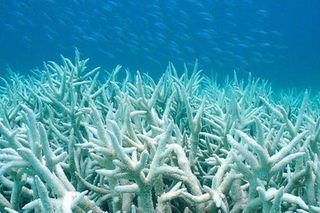
Warming Waters Leave Great Barrier Reef on Verge of Mass Coral Death
It would be the third such mass coral bleaching to hit the world’s largest reef system in five years.

Warmer than usual waters off the coast of Australia have put the Great Barrier Reef on the verge of mass coral death. The event would be the third such mass coral bleaching to occur in the past five years.
While not yet inevitable, all signs point to an impending bleaching. Already, sea surface temperatures across two-thirds of the reef are 2 to 3 degrees warmer than the February average, reports The Guardian, with one month of summer to go; temperatures usually peak in mid-March. Sustained high water temperatures cause coral death. Scientists say it’s a matter of 10 days to a few weeks before they are sure a mass bleaching will occur.
Ocean temperatures are on the rise globally; seawater absorbs the majority of the increased atmospheric heat generated from greenhouse gases like CO2. A recent report suggests a mere 88 corporations worldwide, including Coal India, are responsible for the vast majority of greenhouse gas emissions endangering oceanic ecosystems like coral reefs.
There’s a chance that water temperatures could cool in the event of precipitation, and spare the Great Barrier Reef a third mass bleaching, reports the Sydney Morning Herald, but currently, no thunderstorms or cyclones are predicted in the coming weeks.
“If [mass bleaching] happens or not will depend on the vagaries of the weather for the next two weeks,” Terry Hughes, PhD, a professor, and director of the ARC Centre of Excellence for Coral Reef Studies at James Cook University, told The Guardian Australia.
Related on The Swaddle:
Chennai’s Newly Bioluminescent Beach Does Not Bode Well for Its Marine Life
Scientists have already recorded spot bleaching in 30% to 40% of coral in shallow waters, according to Lyle Vail, director of the Australian Museum’s Lizard Island Research Station which is part of the Great Barrier Reef Marine Park.
“The bright blue staghorn coral is … fluorescing – another sign a coral is in distress,” Vail said in a statement from the WWF-Australia.
Coral gets its vivid color from zooxanthellae, a type of algae that thrives on its surface and also provides energy. When water temperatures rise too high, the coral expels the algae, becoming a chalky bleach-white and eventually dying.
The first two mass bleachings, during the summers of 2016 and 2017, killed roughly half of the coral in the world’s largest reef system. A third bleaching could have devastating effects, as it would nix the possibility of reef recovery.
“We found that the time needed for coral reefs to recover from bleaching is at least 9 to 12 years — if there is no new disturbance in the meantime, such as a cyclone or re-bleaching,” Eric Wolanski, Ph.D., of James Cook University, said in a 2019 statement about his research on coral bleaching in the reef systems of the Pacific Island of Palau.
Coral reefs are some of the most biodiverse ecosystems in the world. They also are the foundation of many marine and tourism livelihoods for the humans who live near them. In 2017, a Delloite Access Economics report valued the Great Barrier Reef at US$56 billion in terms of economic, social and tourism worth, though its methodology was criticized by some environmental economists who say because the reef is irreplaceable, it can’t truly be valued monetarily.
Climate change is expected to bleach and kill 70% to 90% of the world’s coral reefs within the next 20 years, according to recent research by scientists from the University of Hawaii Manoa. Virtually no coral reefs will be left by the turn of the century.
“By 2100, it’s looking quite grim,” Renee Setter, one of the University of Hawaii Manoa researchers, said in a statement in February.
Experts have been calling for action to save coral reefs for years, now, but have become more categorical as the toll from climate change mounts.
“Surely after this summer of bushfires, and this marine heatwave hitting the reef, we cannot keep burying our heads in the sand,” Richard Leck, head of oceans at WWF-Australia, told The Guardian. “We need a reef-safe climate policy that’s consistent with a 1.5C global warming target, or less.
“No more excuses will be tolerated.”
Liesl Goecker is The Swaddle's managing editor.
Related


Why Is It Difficult to Change People’s Minds?
